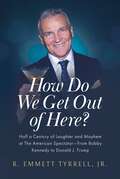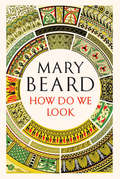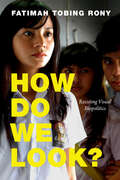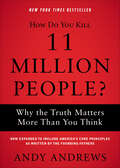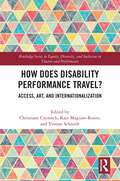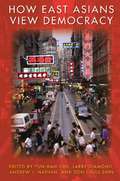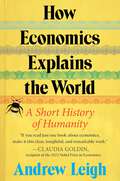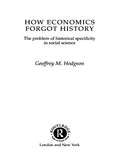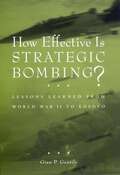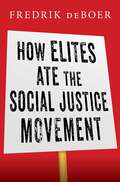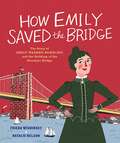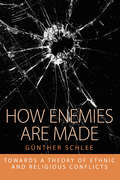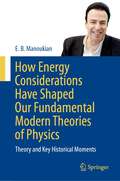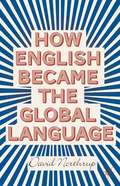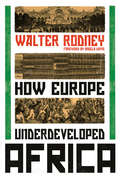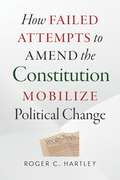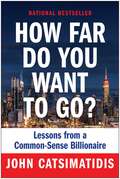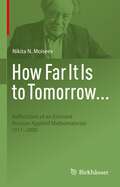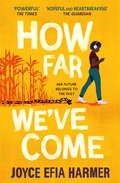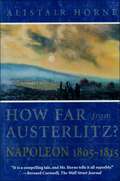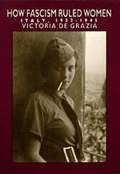- Table View
- List View
How Do We Get Out of Here?: Half a Century of Laughter and Mayhem at The American Spectator—From Bobby Kennedy to Donald J. Trump
by R. Emmett Tyrrell Jr.How Do We Get Out of Here? is R. Emmett Tyrrell, Jr.&’s intimate memoir, detailing his leadership in the conservative movement and his relationships with its major personalities from 1968 to the present.When R. Emmett Tyrrell, Jr. was a conservative college student in 1968, he watched as Senator Robert Kennedy gave a rousing campaign speech. When Senator Kennedy asked him, &“How do we get out of here?&” Tyrrell—the only other person onstage—not only escorted the candidate to his car but boldly pressed a &“Reagan for President&” button into the legendary Democrat&’s hand. This early, irreverent political prank marked Tyrrell&’s entrance into what would become a decades-long engagement at the heart of American politics as founder and publisher of the legendary conservative magazine, The American Spectator. Tyrrell has now written a candid memoir of those tumultuous years, complete with fascinating—and often, uproarious—behind-the-scenes vignettes of the turbulent politics and the most prominent political and literary personalities of the era, including the Spectator&’s furious political battles with Bill Clinton, the author&’s close association with Ronald Reagan, his warm relations and competition with William F. Buckley of the National Review, his friendship with a post-presidential Richard Nixon, and the chaotic years of Donald Trump&’s presidency. Written in Tyrrell&’s trademark unfailing and bitingly satirical style, How Do We Get Out of Here? is an invaluable and intimate recount of the political and cultural battles that shaped our contemporary politics, written by a raconteur whose fearless muckraking materially impacted the politics of the modern era.
How Do We Look: The Body, The Divine, And The Question Of Civilization
by Mary BeardFrom prehistoric Mexico to modern Istanbul, Mary Beard looks beyond the familiar canon of Western imagery to explore the history of art, religion, and humanity. Conceived as a gorgeously illustrated accompaniment to “How Do We Look” and “The Eye of Faith,” the famed Civilisations shows on PBS, renowned classicist Mary Beard has created this elegant volume on how we have looked at art. Focusing in Part I on the Olmec heads of early Mesoamerica, the colossal statues of the pharaoh Amenhotep III, and the nudes of classical Greece, Beard explores the power, hierarchy, and gender politics of the art of the ancient world, and explains how it came to define the so-called civilized world. In Part II, Beard chronicles some of the most breathtaking religious imagery ever made—whether at Angkor Wat, Ravenna, Venice, or in the art of Jewish and Islamic calligraphers— to show how all religions, ancient and modern, have faced irreconcilable problems in trying to picture the divine. With this classic volume, Beard redefines the Western-and male-centric legacies of Ernst Gombrich and Kenneth Clark.
How Do We Look?: Resisting Visual Biopolitics (a Camera Obscura book)
by Fatimah Tobing RonyIn How Do We Look? Fatimah Tobing Rony draws on transnational images of Indonesian women as a way to theorize what she calls visual biopolitics—the ways visual representation determines which lives are made to matter more than others. Rony outlines the mechanisms of visual biopolitics by examining Paul Gauguin’s 1893 portrait of Annah la Javanaise—a trafficked thirteen-year-old girl found wandering the streets of Paris—as well as US ethnographic and documentary films. In each instance, the figure of the Indonesian woman is inextricably tied to discourses of primitivism, savagery, colonialism, exoticism, and genocide. Rony also focuses on acts of resistance to visual biopolitics in film, writing, and photography. These works, such as Rachmi Diyah Larasati’s The Dance that Makes You Vanish, Vincent Monnikendam’s Mother Dao (1995), and the collaborative films of Nia Dinata, challenge the naturalized methods of seeing that justify exploitation, dehumanization, and early death of people of color. By theorizing the mechanisms of visual biopolitics, Rony elucidates both its violence and its vulnerability.
How Do You Kill 11 Million People?: Why the Truth Matters More Than You Think
by Andy AndrewsHow do you get away with the murder of 11 million people? The answer is simple—and disturbing. You lie to them. Learn how you can become an informed, passionate citizen who demands honesty and integrity from your leaders in this updated and expanded edition of the original New York Times bestselling book.In this updated and expanded nonpartisan New York Times bestselling book, Andy Andrews emphasizes that seeking and discerning the truth is of critical importance, and that believing lies is the most dangerous thing you can do. You&’ll be challenged to become a more careful student of the past, seeking accurate, factual accounts of events that illuminate choices our world faces now.By considering how the Nazi German regime was able to carry out over eleven million institutional killings between 1933 and 1945, Andrews advocates for an informed population that demands honesty and integrity from its leaders and from each other.This thought-provoking book poses questions like:What happens to a society in which truth is absent?How are we supposed to tell the difference between the &“good guys" and the &“bad guys&”?How does the answer to this question affect our country, families, faith, and values?Does it matter that millions of ordinary citizens aren't participating in the decisions that shape the future of our country? Which is more dangerous: politicians with ill intent, or the too-trusting population that allows such people to lead them?This is a wake-up call: we must become informed, passionate citizens or suffer the consequences of our own ignorance and apathy. We can no longer measure a leader&’s worth by the yardsticks provided by the left or the right. Instead, we must use an unchanging standard: the pure, unvarnished truth.
How Does Disability Performance Travel?: Access, Art, and Internationalization (Routledge Series in Equity, Diversity, and Inclusion in Theatre and Performance)
by Yvonne Schmidt Christiane Czymoch Kate Maguire-RosierThis edited collection investigates the myriad ways in which disability performance travels in a globalized world. Disability arts festivals are growing in different parts of the world; theatre and dance companies with disabled artists are increasingly touring and collaborating with international partners. At the same time, theatre spaces are often not accessible, and the necessity of mobility excludes some disabled artists from being part of an international disability arts community. How does disability performance travel, who does not travel – and why? What is the role of funding and producing structures, disability arts festivals and networks around the world? How do the logics of international (co-)producing govern the way in which disability art is represented internationally? Who is excluded from being part of a touring theatre or dance company, and how can festivals, conferences, and other agents of a growing disability culture create other forms of participation, which are not limited to physical co-presence? This study will contextualize disability aesthetics, arts, media, and culture in a global frame, yet firmly rooted in its smaller national, state, and local community settings and will be of great interest to students and scholars in the field.
How Does Olive Oil Lose its Virginity?: Answers to the Enigmatic Questions of Contemporary Life
by Mark Watson Bruce TindallThis much anticipated sequel to the authors' popular Did Mohawks Wear Mohawks? stimulates the mind as much as it tickles the funny bone with scores of concise, witty answers to the questions you never dared to ask Mom or your high school science teacher! From the ridiculous to the sublime, Tindall and Watson tackle the conundrums of the day, examining everything from the history of "booing" bad performances to the mysterious darkness that lurks in the heart of the oyster. Whether the subject is soft drinks or shrunken heads, bumper stickers or boomerangs, How Does Olive Oil Lose Its Virginity? is your road map through an increasingly wacky world. With over 50 questions on a myriad of topics, How Does Olive Oil Lose Its Virginity? provides readers with hours of entertainment and a wealth of factual knowledge. Each answer has been carefully researched and well documented and offers great background information. And of course, all the answers are peppered with the trademark wit and spunk popularized by Tindall and Watson.
How East Asians View Democracy
by Larry Diamond Doh Chull Shin Andrew J. Nathan Yun-Han ChuEast Asian democracies are in trouble, their legitimacy threatened by poor policy performance and undermined by nostalgia for the progrowth, soft-authoritarian regimes of the past. Yet citizens throughout the region value freedom, reject authoritarian alternatives, and believe in democracy. This book is the first to report the results of a large-scale survey-research project, the East Asian Barometer, in which eight research teams conducted national-sample surveys in five new democracies (Korea, Taiwan, the Philippines, Thailand, and Mongolia), one established democracy (Japan), and two nondemocracies (China and Hong Kong) in order to assess the prospects for democratic consolidation. The findings present a definitive account of the way in which East Asians understand their governments and their roles as citizens. Contributors use their expert local knowledge to analyze responses from a set of core questions, revealing both common patterns and national characteristics in citizens' views of democracy. They explore sources of divergence and convergence in attitudes within and across nations. The findings are sobering. Japanese citizens are disillusioned. The region's new democracies have yet to prove themselves, and citizens in authoritarian China assess their regime's democratic performance relatively favorably. The contributors to this volume contradict the claim that democratic governance is incompatible with East Asian cultures but counsel against complacency toward the fate of democracy in the region. While many forces affect democratic consolidation, popular attitudes are a crucial factor. This book shows how and why skepticism and frustration are the ruling sentiments among today's East Asians.
How Economics Explains the World: A Short History of Humanity
by Andrew Leigh“If you read just one book about economics, make it Andrew Leigh's clear, insightful, and remarkable (and short) work.” —Claudia Goldin, recipient of the 2023 Nobel Prize in Economics and Henry Lee Professor of Economics at Harvard UniversityA sweeping, engrossing history of how economic forces have shaped the world—all in under 200 pagesIn How Economics Explains the World, Harvard-trained economist Andrew Leigh presents a new way to understand the human story. From the dawn of agriculture to AI, here is story of how ingenuity, greed, and desire for betterment have, to an astonishing degree, determined our past, present, and future. This small book indeed tells a big story. It is the story of capitalism – of how our market system developed. It is the story of the discipline of economics, and some of the key figures who formed it. And it is the story of how economic forces have shaped world history. Why didn’t Africa colonize Europe instead of the other way around? What happened when countries erected trade and immigration barriers in the 1930s? Why did the Allies win World War II? Why did inequality in many advanced countries fall during the 1950s and 1960s? How did property rights drive China’s growth surge in the 1980s? How does climate change threaten our future prosperity? You’ll find answers to these questions and more in How Economics Explains the World.
How Economics Forgot History: The Problem of Historical Specificity in Social Science (Economics As Social Theory Ser.)
by Geoffrey M HodgsonIn arguably his most important book to date, Hodgson calls into question the tendency of economic method to try and explain all economic phenomena by using the same catch-all theories and dealing in universal truths. He argues that you need different theories to analyze different economic phenomena and systems and that historical context must be ta
How Economics Works (DK How Stuff Works)
by DKDiscover everything you need to know about economics with this unique graphic guide.Combining clear, jargon-free language and bold, eye-catching graphics, How Economics Works is a comprehensive and user-friendly guide to all aspects of economics.Covering everything from economic theories to economies in action, the book presents the groundbreaking ideas of key economists—from Adam Smith and John Maynard Keynes to Joseph Schumpter and Milton Friedman—in a uniquely visual and easy-to-understand way. Beginning with foundational economic ideas, such as scarcity, marginalism, and the free market, entries then explore the role of choice, markets, trade, and finance, and how whole economies work and are influenced by decisions made by governments and central banks, such as raising taxes or interest rates.With its unique graphic approach and clear, authoritative text, How Economics Works is the perfect introduction to the subject.
How Effective is Fiscal Policy Response in Systemic Banking Crises?
by Sanjeev Gupta Emanuele Baldacci Carlos Mulas-GranadosA report from the International Monetary Fund.
How Effective is Strategic Bombing?: Lessons Learned From World War II to Kosovo
by Gian P. GentileIn the wake of World War II, Secretary of War Henry L. Stimson and President Harry S. Truman established the U.S. Strategic Bombing Survey, to determine exactly how effectively strategic air power had been applied in the European theater and in the Pacific. The final study, consisting of over 330 separate reports and annexes, was staggering in its size and emphatic in its conclusions. As such it has for decades been used as an objective primary source and a guiding text, a veritable Bible for historians of air power. In this aggressively revisionist volume, Gian Gentile examines afresh this influential document to reveal how it reflected to its very foundation the American conceptual approach to strategic bombing. In the process, he exposes the survey as largely tautological and thereby throwing into question many of the central tenets of American air power philosophy and strategy. With a detailed chapter on the Gulf War and the resulting Gulf War Air Power Survey, and a concluding chapter on the lessons of the Kosovo air war, How Effective is Strategic Bombing? is the most comprehensive and important book on air power strategy in decades.
How Elites Ate the Social Justice Movement
by Fredrik deBoerAn eye-opening exploration of American policy reform, or lack thereof, in the wake of the murder of George Floyd and the Black Lives Matter movement and how the country can do better in the future from Fredrik deBoer, &“one of the sharpest and funniest writers on the internet&” (The New York Times).In 2020, while the Covid-19 pandemic raged, the United States was hit by a ripple of political discontent the likes of which had not been seen since the 1960s. The spark was the viral video of the horrific police murder of an unarmed Black man in Minneapolis. The killings of George Floyd galvanized a nation already reeling from Covid and a toxic political cycle. Tens of thousands poured into the streets to protest. Major corporations and large nonprofit groups—institutions that are usually resolutely apolitical—raced to join in. The fervor for racial justice intersected with the already simmering demands for change from the #MeToo movement and for economic justice from Gen Z. The entire country suddenly seemed to be roaring for change in one voice. Then nothing much happened. In How Elites Ate the Social Justice Movement, Fredrik deBoer explores why these passionate movements failed and how they could succeed in the future. In the digital age, social movements flare up but then lose steam through a lack of tangible goals, the inherent moderating effects of our established institutions and political parties, and the lack of any real grassroots movement in contemporary America. Hidden beneath the rhetoric of the oppressed and symbolism of the downtrodden lies and the inconvenient fact that those are doing the organizing, messaging, protesting, and campaigning are predominantly drawn from this country&’s more upwardly mobile educated classes. Poses are more important than policies. deBoer lays out an alternative vision for how society&’s winners can contribute to social justice movements without taking them over, and how activists and their organizations can become more resistant to the influence of elites, nonprofits, corporations, and political parties. Only by organizing around class rather than empty gestures can we begin the hard work of changing minds and driving policy.
How Emily Saved the Bridge: The Story of Emily Warren Roebling and the Building of the Brooklyn Bridge
by Frieda WishinskyThe amazing story of Emily Warren Roebling, the woman who stepped in to oversee the construction of the Brooklyn Bridge, which was completed in 1883.Emily was not an engineer, but she was educated in math and science. She married Washington Roebling, the chief engineer of the famous bridge. When Washington became ill from decompression sickness, Emily stepped in, doing everything from keeping the books, to carrying messages for her husband, to monitoring the construction of the bridge. She was the first person to cross the Brooklyn Bridge when it opened.Emily, who went on to study law among many other accomplishments, is an inspiration to all, as demonstrated through Frieda Wishinsky’s informative and engaging text and Natalie Nelson’s distinctive collage illustrations. Speech bubbles revealing imagined dialogue add a playful note to this historical account, which includes fascinating facts about the Brooklyn Bridge and a further reading list.Key Text Featuresfurther readingspeech bubblesCorrelates to the Common Core State Standards in English Language Arts:CCSS.ELA-LITERACY.RL.2.1Ask and answer such questions as who, what, where, when, why, and how to demonstrate understanding of key details in a text.CCSS.ELA-LITERACY.RL.4.3Describe in depth a character, setting, or event in a story or drama, drawing on specific details in the text (e.g., a character's thoughts, words, or actions).
How Enemies Are Made
by Günther SchleeIn popular perception cultural differences or ethnic affiliation are factors that cause conflict or political fragmentation although this is not borne out by historical evidence. This book puts forward an alternative conflict theory. The author develops a decision theory which explains the conditions under which differing types of identification are preferred. Group identification is linked to competition for resources like water, territory, oil, political charges, or other advantages. Rivalry for resources can cause conflicts but it does not explain who takes whose side in a conflict situation. This book explores possibilities of reducing violent conflicts and ends with a case study, based on personal experience of the author, of conflict resolution.
How Energy Considerations Have Shaped Our Fundamental Modern Theories of Physics: Theory and Key Historical Moments
by E. B. ManoukianAt long last, with sufficient technical details, emphasizing key historical moments, a book that develops all of fundamental modern theoretical physics from energy considerations in a compact form. Starting with a few electron-volts of atoms in the quantum world at low energies extending up to quantum gravity and beyond to the birth of the Universe, readers will experience the entire spectrum of fundamental modern theoretical physics, with one theory leading to another in an integrated unified manner. Energy considerations lead to the development of special and general relativity, quantum field theory, renormalization theory, modern quantum electrodynamics, electro-weak theory, the standard model of particle physics, grand unified theories, string theory, the current standard model of inflationary big bang theory, and even to the birth of the Higgs field, and in developments of quantum gravity. Unfortunately, due to strong specialization within theirfields, students and many practicing physicists are exposed only to parts of the beautiful story of modern fundamental physics. Here the entire story is told! This is a must-read book for graduate students, advanced undergraduate students, instructors and professionals who are interested in all aspects of fundamental modern theoretical physics and key historical moments in its development.
How English Became The Global Language
by David NorthrupIn this book, the first written about the globalization of the English language by a professional historian, the exploration of English's global ascendancy receives its proper historical due. This brief, accessible volume breaks new ground in its organization, emphasis on causation, and conclusions.
How Europe Underdeveloped Africa
by Angela Davis Walter RodneyThe classic work of political, economic, and historical analysis, powerfully introduced by Angela DavisIn his short life, the Guyanese intellectual Walter Rodney emerged as one of the leading thinkers and activists of the anticolonial revolution, leading movements in North America, South America, the African continent, and the Caribbean. In each locale, Rodney found himself a lightning rod for working class Black Power. His deportation catalyzed 20th century Jamaica's most significant rebellion, the 1968 Rodney riots, and his scholarship trained a generation how to think politics at an international scale. In 1980, shortly after founding of the Working People's Alliance in Guyana, the 38-year-old Rodney would be assassinated.In his magnum opus, How Europe Underdeveloped Africa, Rodney incisively argues that grasping "the great divergence" between the west and the rest can only be explained as the exploitation of the latter by the former. This meticulously researched analysis of the abiding repercussions of European colonialism on the continent of Africa has not only informed decades of scholarship and activism, it remains an indispensable study for grasping global inequality today.
How Failed Attempts to Amend the Constitution Mobilize Political Change
by Roger C. HartleySince the Constitution's ratification, members of Congress, following Article V, have proposed approximately twelve thousand amendments, and states have filed several hundred petitions with Congress for the convening of a constitutional convention. Only twenty-seven amendments have been approved in 225 years. Why do members of Congress continue to introduce amendments at a pace of almost two hundred a year?This book is a demonstration of how social reformers and politicians have used the amendment process to achieve favorable political results even as their proposed amendments have failed to be adopted. For example, the ERA "failed" in the sense that it was never ratified, but the mobilization to ratify the ERA helped build the feminist movement (and also sparked a countermobilization). Similarly, the Supreme Court's ban on compulsory school prayer led to a barrage of proposed amendments to reverse the Court. They failed to achieve the requisite two-thirds support from Congress, but nevertheless had an impact on the political landscape. The definition of the relationship between Congress and the President in the conduct of foreign policy can also be traced directly to failed efforts to amend the Constitution during the Cold War.Roger Hartley examines familiar examples like the ERA, balanced budget amendment proposals, and pro-life attempts to overturn Roe v. Wade, but also takes the reader on a three-century tour of lesser-known amendments. He explains how often the mere threat of calling a constitutional convention (at which anything could happen) effected political change.
How Failed Attempts to Amend the Constitution Mobilize Political Change
by Roger C. HartleySince the Constitution's ratification, members of Congress, following Article V, have proposed approximately twelve thousand amendments, and states have filed several hundred petitions with Congress for the convening of a constitutional convention. Only twenty-seven amendments have been approved in 225 years. Why do members of Congress continue to introduce amendments at a pace of almost two hundred a year? This book is a demonstration of how social reformers and politicians have used the amendment process to achieve favorable political results even as their proposed amendments have failed to be adopted. For example, the ERA "failed" in the sense that it was never ratified, but the mobilization to ratify the ERA helped build the feminist movement (and also sparked a countermobilization). Similarly, the Supreme Court's ban on compulsory school prayer led to a barrage of proposed amendments to reverse the Court. They failed to achieve the requisite two-thirds support from Congress, but nevertheless had an impact on the political landscape. The definition of the relationship between Congress and the President in the conduct of foreign policy can also be traced directly to failed efforts to amend the Constitution during the Cold War. Roger Hartley examines familiar examples like the ERA, balanced budget amendment proposals, and pro-life attempts to overturn Roe v. Wade, but also takes the reader on a three-century tour of lesser-known amendments. He explains how often the mere threat of calling a constitutional convention (at which anything could happen) effected political change.
How Far Do You Want to Go?: Lessons from a Common-Sense Billionaire
by John CatsimatidisWall Street Journal Bestseller Publishers Weekly Bestseller Billionaire entrepreneur John Catsimatidis, owner and CEO of the Red Apple Group, reveals how his instincts and common sense have propelled him to massive business success in this detailed account of an incredible rags-to-riches story. Born on the small Greek island of Nisyros, John Catsimatidis immigrated to the States with his family and quickly became a true New Yorker, raised in Harlem. He went to school by day and worked in a small grocery store by night to help his parents pay the bills until, just eight credits short of graduating from New York University, he opted to work in the grocery business full-time. Today, that grocery business has become the Red Apple Group, a conglomerate with interests in energy, real estate, aviation, baseball, entertainment, and media, including the iconic radio station WABC, where John hosts leading figures in government, politics, business, and economics. As Catsimatidis has discovered, the American Dream doesn&’t come with an instruction manual—or even a sign to let you know when you&’ve arrived at the finish line. How Far Do You Want to Go? tells Catsimatidis&’s dynamic story, from his beginnings in the grocery business to entering the political arena, including a New York City mayoral campaign. He&’s tried his hand at nearly everything, but he&’s far from finished with his adventures. Now, he offers readers a glimpse into the wisdom he&’s gained—and the excitement he has for what the future holds in store.
How Far It Is to Tomorrow...: Reflections of an Eminent Russian Applied Mathematician 1917-2000
by Nikita N. MoiseevThis is a translated autobiography of applied mathematician N. N. Moiseev, providing an insider’s view of the history of the Soviet Union from its founding in 1917 to its collapse in 1991, as well as a little of the aftermath.We see vividly the precariousness of life just after the October Revolution; his happy family life during the years 1921-28 of Lenin’s New Economic Policy; the subsequent destruction of his family by Stalin’s regime; his trials as a social outcast; his student days at Moscow State University; his experiences as a Soviet Air Force Engineer in World War II, including sorties as a gunner and a brush with an NKVD agent; post-war euphoria, marriage, and another round of ostracism; and then the vicissitudes of a highly varied academic career. Here we meet many famous Soviet and Western engineers and scientists. The last several chapters are devoted more to wide-ranging reflections on God, philosophy, science, communism, modelling the biosphere, and the threat of nuclear winter. His thoughts concerning the impending and then final collapse of the USSR, as well as hopes for Russia’s future, conclude the journey through Moiseev's life.
How Far We've Come
by Joyce Efia HarmerFrom debut author, Joyce Efia Harmer, comes a groundbreaking YA story of friendship and freedom that crosses continents and centuries, in a timeslip novel exploring the legacy of slavery. 'A powerful debut' The TimesSometime, me love to dream that me is a human, a proper one, like them white folks is. Enslaved on a plantation in Barbados, Obah dreams of freedom. As talk of rebellion bubbles up around her in the Big House, she imagines escape. Meeting a strange boy who&’s not quite of this world, she decides to put her trust in him. But Jacob is from the twenty-first century. Desperate to give Obah a better life, he takes her back with him. At first it seems like dreams really do come true – until the cracks begin to show and Obah sees that freedom comes at an unimaginable cost . . . Both hopeful and devastating, this powerful novel about equality, how far we&’ve come, and how far we still have to go introduces an extraordinary new literary voice.
How Far from Austerlitz?: Napoleon 1805–1815
by Alistair HorneA London Sunday Times Book of the YearA Daily Telegraph Book of the YearAlistair Horne explores the theme of military success and failure in How Far From Austerlitz? chronicling Napoleon's rise and fall, drawing parallels with other great leaders of the modern era. The Battle of Austerlitz was Napoleon's greatest victory, the culmination of one of the greatest military campaigns of all time. It was also the last battle the "Father of Modern Warfare" would leave in absolute triumph, for, though he did not know it, Austerlitz marked the beginning of Napoleon's downfall. His triumph was too complete and his conquest too brutal to last. Like Hitler, he came to believe he was invincible, that no force could halt his bloody march across Europe. Like Hitler, he paid dearly for his hubris, climaxing in bitter defeat at Waterloo in 1815. In a matter of years, he had fallen from grace.
How Fascism Ruled Women: Italy, 1922-1945
by Victoria De Grazia"Italy has been made; now we need to make the Italians, " is a long-familiar Italian saying. Mussolini was the first head of government to include women in this mandate. What the fascist dictatorship expected of its female subjects and how they experienced the Duce's brutal but seductive rule are the main topics of Victoria de Grazia's new book. The author draws on an unusual array of sources--memoirs, novels, and reports on the images and events of mass culture, as well as government statistics and archival accounts--to present a broad yet detailed characterization of Italian women's ambiguous and ambivalent experience of a regime that promised women modernity, yet denied them freedom. Always attentive to the great diversity among women and careful to distinguish fascist rhetoric from the practices actually shaping daily existence, de Grazia moves with ease from the public discourse about maternity and family life to the images of femininity in commercial culture. The first study of women's experience under Italian fascism, this book offers a compelling treatment of the making of contemporary Italian society. With acute comparisons between the sexual politics of Italian fascism and developments elsewhere, including Hitler's Germany, de Grazia illuminates trends and dilemmas common to the construction of female citizenship in twentieth-century societies.
